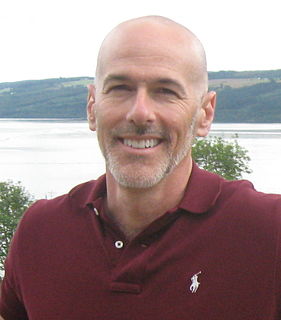A Quote by Neil deGrasse Tyson
The number of people in the world engaged in this search for catastrophic impactors totals one or two dozen. How long into the future are you willing to protect Homo sapiens on Earth? Before you answer that question, take a detour to Arizona's Meteor Crater during your next vacation.
Related Quotes
To be a scientist you have to be willing to live with uncertainty for a long time. Research scientists begin with a question and they take a decade or two to find an answer. Then the answer they get may not even answer the question they thought it would. You have to have a supple enough mind to be open to the possibility that the answer sometimes precedes the question itself.
But to carve the Grand Canyon, Earth required millions of years. To excavate Meteor Crater, the universe, using a sixty-thousand-ton asteroid traveling upward of twenty miles per second, required a fraction of a second. No offense to Grand Canyon lovers, but for my money, Meteor Crater is the most amazing natural landmark in the world.
If humans one day become extinct from a catastrophic collision, there would be no greater tragedy in the history of life in the universe. Not because we lacked the brain power to protect ourselves but because we lacked the foresight. The dominant species that replaces us in post-apocalyptic Earth just might wonder, as they gaze upon our mounted skeletons in their natural history museums, why large headed Homo sapiens fared no better than the proverbially peabrained dinosaurs.
Each day as I travel through downtown Tucson, I am amazed at how quickly the most ancient of human behaviors have changed. For as long as there have been Homo sapiens - roughly 200,000 years - people have filled their lives principally with two activities: talking directly with other people, and doing physical things.
When you think about what Homo sapiens are about, you almost feel that we are replacing ourselves. We won't be able to breathe and breed on this earth, so we replace ourselves with androids that can do. The androids can go up into space and take the future of humanity forward because maybe we just bow out with a carbon-based epoch.
Answer my question, Bacchus. I’m not one of your dickless Greeks to be kept waiting for an answer. (Camulus) You better take a more civil tone with me, Cam. I’m not one of your flaccid Celts to shake in terror of your wrath. You want to fight, boy, bring it on. (Dionysus) Whoa, hang on a second. Let’s save the fighting for when you two take over the world, okay? (Styxx)
It struck me as I listened to those two men that a truer nomination (name) for our species than Homo sapiens might be Homo narrans, the storytelling person. What differentiates us from animals is the fact that we can listen to other people’s dreams, fears, joys, sorrows, desires and defeats–and they in turn can listen to ours.
Human beings are not inevitable, and our brief existence is not preordained to be extended into the distant future. If Homo sapiens is to have a continued presence on earth, humankind will reevaluate its sense of place in the world and modify its strong species-centric stewardship of the planet. Our collective concepts of morality and ethics have a direct impact on our species' ultimate fate.



































